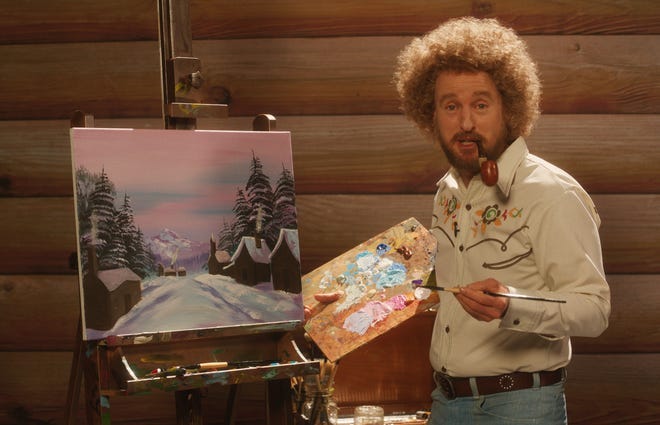Paint (2023)
Carl Nargle hosts a show called Paint on the Burlington, Vermont PBS station, where he, well, paints some tranquil landscape, often of Mount Mansfield, while giving positive vibes in a soft, soothing voice. Young and old alike watch him every day and smile. “Thank you for going to a special place with me,” he says at the end of every show.
It’s a very sweet sentiment until a little bit later when we see a flashback of Carl saying the same thing to Katherine, his girlfriend, before heading for the fold-out bed at the back of his van.
After that it’s just creepy. Carl keeps saying the “special place” bit to women as a pickup line, most of whom work at his PBS station, and they fall for it. Carl can convince a vegan to eat veal and cheese at a fondue restaurant even though it makes her throw up later. Another woman is thrilled just to touch Carl’s sandals. Yeah, he’s a lothario and a divo.
It’s amazing that Carl’s act works so well, because he’s stuck in the past. He’s been driving the same van for twenty-two years, he still uses rotary phones, and he’s had the same hairdo and wardrobe for a few decades. He likes to talk through his CB radio as if he’s the Great and Powerful Oz. He’s so out of touch he doesn’t even know what an Uber is.
Then again, he gets by on star power. Carl’s catchphrase gets even creepier when a fan pulls up next to Carl at a stoplight and tells Carl he’s been going to “a special place” with him since he was nine.
I know the guy was probably referring to Carl’s painting show, but eeeewww.
Then Carl finds out his station is hiring a new painter, Ambrosia, to host a new show that will air right after his because his ratings are dropping. He’s OK with it until she becomes the icing on the cake and he’s barely the cake. Carl watches helplessly as his star plummets while Ambrosia’s rises, and he starts feeling lost, especially when Ambrosia goes after Katherine. Carl gets so distraught that he steals newspapers out of people’s yards.
It’s not funny. From start to finish the movie feels as if it’s trying too hard, and there are some very awkward scenes that could have been much, much punchier than they were. As they are, they’re just flat and bereft of potential.
This could have been a nice, quirky indie, too. Owen Wilson can’t help but be quirky. Stephen Root, who plays the station manager, Tony, is an equally unusual and very versatile actor, having played both offbeat characters like Milton Waddams and goodhearted souls like Clarence Sweetwater. He steals every scene he’s in.
Paint wants to be a Wes Anderson movie so badly it can taste it. On one hand it seems to be set in the present day, but on the other hand, it likes to employ retro-ish tableau-style scene composition. Carl’s favorite barber shop is a particularly pointed homage, as it’s unfailingly stylized, with a guy constantly sitting by and watching all the goings-on like Pagoda in The Royal Tenenbaums.
The problem is that Paint doesn’t lean firmly enough into either approach to be anything but pretentious and sticky, and towards the end of the film the stickiness is real. In one scene Nargle gets high on marijuana, then throws paint on his wall of paintings, and when he’s out of buckets he rubs his fro all over the wet paint.
We see this from the wall’s point of view. Ugh.
The Bob Ross angle of the movie is so obvious it’s hardly worth mentioning, especially since we don’t see any happy trees or happy accidents, just a big, old disturbing mess. While it has some nice moments, they’re heavily obscured behind clumsy comedy and that’s a real shame. I spent most of the movie glowering at the screen and wishing it was over before heading home to watch Netflix’s Bob Ross: Happy Accidents, Betrayal and Greed by way of a brain cleanser.
Paint is currently in theaters. Rated PG-13
My grade: C
Principal cast: Owen Wilson, Elisabeth Henry, Paul Kosopod, Sonia Darmel Lopes, Lucy Freyer, Lucia Strus, Wendi McLeven-Covey, Stephen Root, Michaela Watkins, Donald Figueroa, Michael Pemberton, Vin Craig, Evander Duck, Jr., Joel Leffert, Ciara Renee, Elizabeth Loyacano, Ryan Czerwonko, Aiden T.K. Baker
Written and directed by Brit McAdams.




